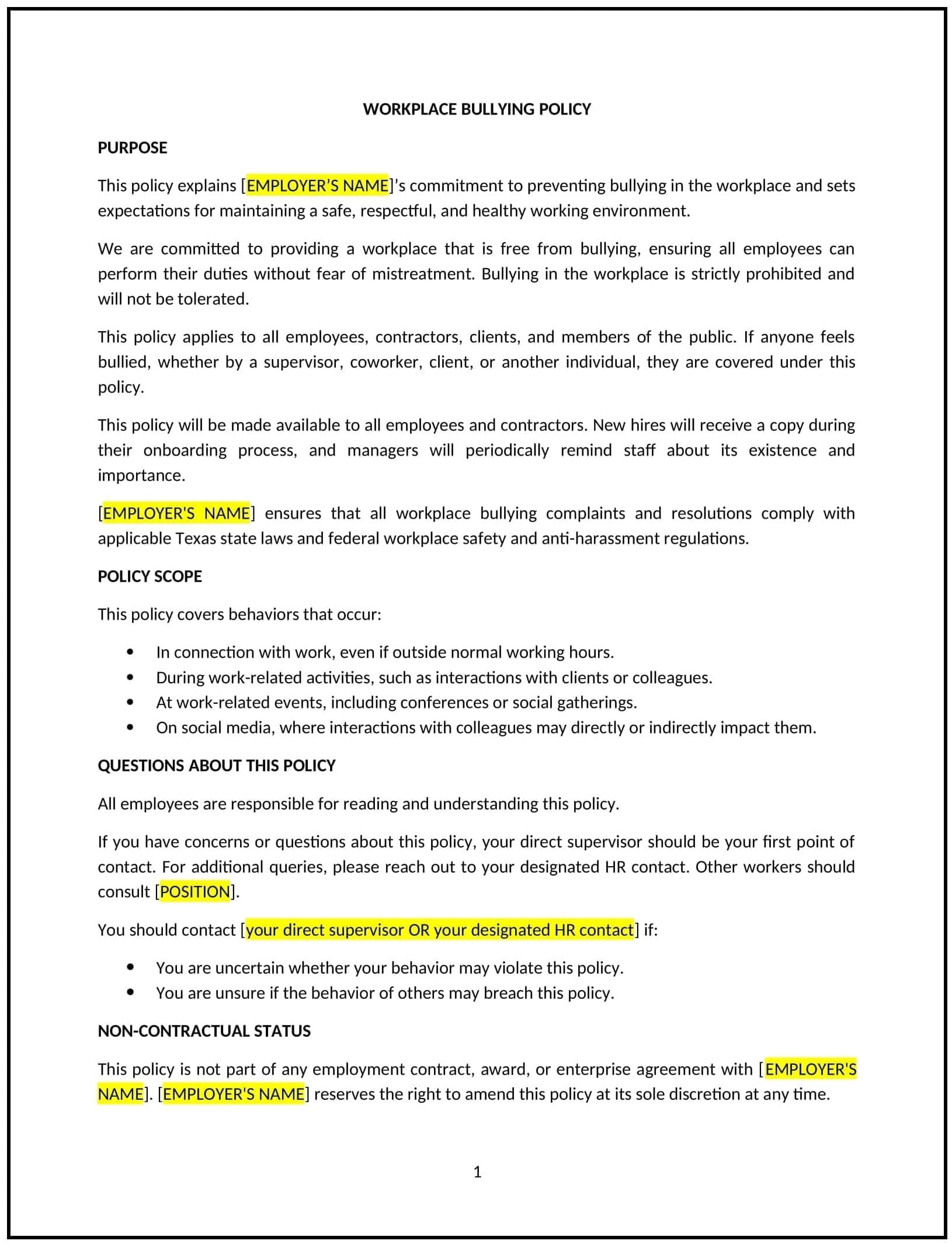Got contracts to review? While you're here for policies, let Cobrief make contract review effortless—start your free review now.

Customize this template for free
Workplace bullying policy (Texas)
This workplace bullying policy is designed to help Texas businesses define, prevent, and address bullying in the workplace. The policy outlines what constitutes workplace bullying, the steps employees can take to report incidents, the process for investigating complaints, and the potential consequences of bullying behavior. It is designed to ensure a safe, respectful, and productive work environment for all employees.
By adopting this policy, businesses can foster a culture of respect, improve employee well-being, and reduce the risk of legal liability related to workplace harassment and bullying.
How to use this workplace bullying policy (Texas)
- Define workplace bullying: Clearly define what constitutes workplace bullying, including behaviors such as verbal abuse, physical intimidation, exclusion, threats, humiliation, or any other behavior that creates a hostile work environment. Specify that bullying can occur between employees, supervisors, and even third parties (e.g., customers or contractors).
- Establish a zero-tolerance policy: Emphasize that the company has a zero-tolerance stance on bullying and that such behavior will not be tolerated under any circumstances. Make it clear that all employees, regardless of position or tenure, are expected to behave respectfully and professionally.
- Outline reporting procedures: Provide clear instructions on how employees can report incidents of workplace bullying, whether it’s done formally through HR, via a confidential hotline, or through a designated reporting system. Employees should be encouraged to report bullying without fear of retaliation.
- Set investigation procedures: Specify the steps the company will take to investigate claims of workplace bullying, including how complaints will be handled, who will conduct investigations, and the timeline for resolution. The policy should ensure that investigations are thorough, impartial, and fair to all parties involved.
- Address consequences of bullying: Clearly state the potential disciplinary actions for employees found guilty of bullying, including counseling, suspension, or termination, depending on the severity of the behavior.
- Offer support for affected employees: Include provisions for providing support to employees who have been affected by bullying, such as counseling services, employee assistance programs (EAPs), or time off to manage the emotional impact.
- Encourage a respectful work environment: Promote a culture of respect, teamwork, and open communication where bullying behavior is not tolerated, and employees are encouraged to treat each other with dignity and professionalism.
- Ensure compliance with Texas laws: Ensure the policy complies with Texas state laws regarding workplace harassment and bullying, including the Texas Labor Code and any relevant federal laws.
Benefits of using this workplace bullying policy (Texas)
This policy offers several benefits for Texas businesses:
- Promotes a positive work culture: By taking a strong stance against workplace bullying, businesses foster a culture of respect, trust, and collaboration, which can lead to a more positive and productive work environment.
- Reduces the risk of legal claims: A clearly defined and implemented bullying policy helps businesses reduce the risk of legal claims related to harassment or hostile work environments.
- Increases employee morale: Employees who feel safe and respected in the workplace are more likely to be engaged and productive. Addressing bullying helps improve overall morale and job satisfaction.
- Improves retention: Employees who experience bullying or harassment are more likely to leave the company. By addressing bullying early and effectively, businesses can retain top talent and reduce turnover.
- Enhances company reputation: Companies that have clear anti-bullying policies are viewed positively by employees, potential employees, and customers. This can improve the company’s reputation as a responsible employer.
- Supports employee well-being: By addressing bullying and providing support to affected employees, businesses can reduce stress and anxiety in the workplace, which contributes to better mental health and well-being.
Tips for using this workplace bullying policy (Texas)
- Communicate the policy clearly: Ensure that all employees are aware of the workplace bullying policy, how to report bullying incidents, and what support is available. This can be communicated through employee handbooks, training sessions, or internal newsletters.
- Provide training: Regularly provide training to employees and supervisors on recognizing and preventing workplace bullying, and on how to intervene when witnessing bullying behavior.
- Encourage early intervention: Encourage employees to report bullying behavior as soon as it occurs, before it escalates into a more serious issue. Early intervention can help prevent more severe consequences.
- Maintain confidentiality: Ensure that all bullying complaints are handled confidentially to protect the privacy of the individuals involved and to foster trust in the reporting process.
- Be consistent in applying the policy: Ensure that the policy is applied fairly and consistently to all employees, regardless of their position or seniority. This will help maintain a respectful and equitable work environment.
- Review the policy regularly: Periodically review and update the policy to ensure that it remains aligned with Texas state laws, federal regulations, and best practices for addressing workplace bullying.